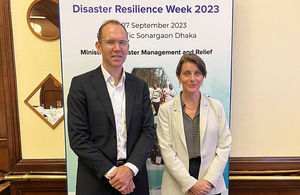This money will aid in the coordination of humanitarian assistance provided by the Government of Bangladesh, donors, the UN, and NGOs prior to, during, and after disaster events. It will also ensure that this help reaches the most vulnerable people with the most essential relief supplies.
Furthermore, it will assist the Government of Bangladesh in developing a new risk assessment and contingency plan for earthquakes, as well as expand its work on anticipatory actions and early warning systems to assist people in taking precautions to protect their lives before disasters strike.
UK Development Director and Deputy High Commissioner in Bangladesh, Matt Cannell, said
“The devastating flooding in Sylhet last year and Chittagong Division this year demonstrate Bangladesh’s vulnerabilities to the impacts of climate change.
“The UK is proud to partner with the UN Resident Coordinator’s Office to support greater disaster preparedness, response, and recovery in Bangladesh. I am pleased to announce this during the Government of Bangladesh and UNDP’s Disaster Resilience Week.
“This will help guarantee that disaster responses are coordinated and well-informed, and that more preparations are made ahead of disasters, limiting their impact and saving lives.
“This builds on the UK’s historic support for humanitarian response in Bangladesh and complements the Government of Bangladesh’s remarkable work on disaster resilience and response to date.”
Gwyn Lewis, UN Resident Coordinator in Bangladesh, said
“The partnership with the UK will enhance coordination across the UN and NGOs in Bangladesh, and as a result strengthen support to the government of Bangladesh, and most importantly to the people most affected by natural disasters. The impact of climate change and the resulting intensity of disasters means this work is more important than ever. Our efforts are focused on better early warning systems, anticipatory action and a quick and timely response to emergencies and disasters.”

















